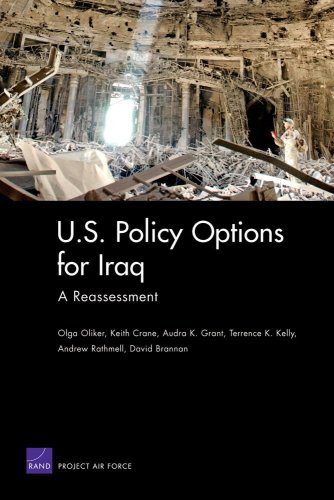

Most ebook files are in PDF format, so you can easily read them using various software such as Foxit Reader or directly on the Google Chrome browser.
Some ebook files are released by publishers in other formats such as .awz, .mobi, .epub, .fb2, etc. You may need to install specific software to read these formats on mobile/PC, such as Calibre.
Please read the tutorial at this link: https://ebookbell.com/faq
We offer FREE conversion to the popular formats you request; however, this may take some time. Therefore, right after payment, please email us, and we will try to provide the service as quickly as possible.
For some exceptional file formats or broken links (if any), please refrain from opening any disputes. Instead, email us first, and we will try to assist within a maximum of 6 hours.
EbookBell Team

4.3
88 reviews

ISBN 10: 128118117X
ISBN 13: 9786611181178
Author: Olga Oliker, Rand Corporation
Iraq is the most pressing national security issue facing the United States today. This book evaluates the costs and benefits of five alternative strategies the United States could pursue in Iraq. The authors argue that, as long as the United States remains in Iraq, policy actions must focus on improving the security of Iraq's population by reducing violence. They offer recommendations for ways in which U.S. political, security, and economic policies in Iraq could be better geared to support this goal, though they emphasize the challenges inherent in this endeavor. Specific recommendations focus on embedding and vetting efforts for both forces and government structures and on targeting economic assistance more effectively. The authors also suggest policies that might be implemented if violence subsides-but that should not be undertaken unless and until it does. The book concludes with a discussion of next steps if the United States decides to withdraw from Iraq, arguing that the United States needs to prepare now to mitigate the effects of failure.
Cover
Preface
Contents
Summary
Acknowledgments
Abbreviations
Chapter One - Introduction
The Problem of Iraq
The Situation Today
Chapter Two - Defining and Assessing Alternative Strategies for Iraq
Employ Overwhelming Force
Pick, and Back, Winners
Partition
Leave
Maintain Current Efforts
From Strategy to Policy
Chapter Three - Political Suasion
Maintain a National Unity Government
Engaging Iraq's Neighbors
Chapter Four - Security: Targeting Aid and Influence
Get the Ministry of Interior Under Control
Improve Policing
Police Organization and Recruiting
Law and Order
Reduce Financial Flows to Militias and Other Illegal Groups
Coalition Force Employment
Balance Baghdad and the Rest of Iraq
Public Information
Chapter Five - How Economic Policies Can Help
Liberalize Refined Oil Product Prices
Improve the Operations of the Oil Ministry
Concentrate U.S. Grant Aid on the Security Sector and Improving Iraqi Government Operations
Follow "Clear and Hold" Operations with Local Projects, Not Make-work Job Programs
Give the Iraqi Government Credit
Chapter Six - Policy Priorities If — and Only if — Violence Declines
Politics and Security
Economic Policies
Chapter Seven - Next Steps If Violence Fails to Decline
When Is It Time to Go Home?
How Should We Leave?
What Would Be the Repercussions of Withdrawal?
What Could the United States Do to Mitigate the Repercussions of Withdrawal?
References
Resumen
u s policy options for iraq a reassessment
us policy in iraq
us foreign policy in iraq
aua/ipss
foreign policy persian gulf war
Tags: Olga Oliker, Rand Corporation, U S Policy, Options, Iraq, Reassessment